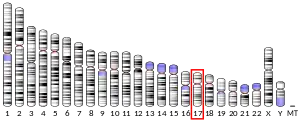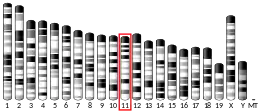G6PC3
Glucose-6-phosphatase 3, also known as glucose-6-phosphatase beta, is an enzyme that in humans is encoded by the G6PC3 gene.[5][6][7]
Function
This gene encodes the catalytic subunit of glucose 6-phosphatase (G6Pase). G6Pase is located in the endoplasmic reticulum (ER) and catalyzes the hydrolysis of glucose 6-phosphate to glucose and phosphate in the last step of the gluconeogenic and glycogenolytic pathways.[5]
Clinical significance
Mutations in this gene result in autosomal recessive severe congenital neutropenia.[8]
G6PC3 deficiency results in a phenotypic continuum.[9][10] At one end the affected individuals have only neutropenia and related complications but no other organ is affected. This is sometimes referred to as non-syndromic or isolated severe congenital neutropenia.[11] Most affected individuals have a classic form of the disease with severe congenital neutropenia and cardiovascular and/or urogenital abnormalities.[12][13] Some individuals have severe G6PC3 deficiency (also known as Dursun syndrome) and they have all the features of classic G6PC3 deficiency but in addition show involvement of non-myeloid hematopoietic cell lines, some other extra-hematologic features and pulmonary hypertension.[14]
References
- GRCh38: Ensembl release 89: ENSG00000141349 - Ensembl, May 2017
- GRCm38: Ensembl release 89: ENSMUSG00000034793 - Ensembl, May 2017
- "Human PubMed Reference:". National Center for Biotechnology Information, U.S. National Library of Medicine.
- "Mouse PubMed Reference:". National Center for Biotechnology Information, U.S. National Library of Medicine.
- "Entrez Gene: glucose 6 phosphatase".
- Martin CC, Oeser JK, Svitek CA, Hunter SI, Hutton JC, O'Brien RM (October 2002). "Identification and characterization of a human cDNA and gene encoding a ubiquitously expressed glucose-6-phosphatase catalytic subunit-related protein". Journal of Molecular Endocrinology. 29 (2): 205–22. doi:10.1677/jme.0.0290205. PMID 12370122.
- Guionie O, Clottes E, Stafford K, Burchell A (September 2003). "Identification and characterisation of a new human glucose-6-phosphatase isoform". FEBS Letters. 551 (1–3): 159–64. doi:10.1016/S0014-5793(03)00903-7. PMID 12965222. S2CID 38286129.
- Boztug K, Appaswamy G, Ashikov A, Schäffer AA, Salzer U, Diestelhorst J, et al. (January 2009). "A syndrome with congenital neutropenia and mutations in G6PC3". The New England Journal of Medicine. 360 (1): 32–43. doi:10.1056/NEJMoa0805051. PMC 2778311. PMID 19118303.
- Banka, Siddharth (1993). "G6PC3 Deficiency". GeneReviews. University of Washington, Seattle. PMID 25879134.
- Banka S, Newman WG (June 2013). "A clinical and molecular review of ubiquitous glucose-6-phosphatase deficiency caused by G6PC3 mutations". Orphanet Journal of Rare Diseases. 8: 84. doi:10.1186/1750-1172-8-84. PMC 3718741. PMID 23758768.
- Banka S, Wynn R, Byers H, Arkwright PD, Newman WG (February 2013). "G6PC3 mutations cause non-syndromic severe congenital neutropenia". Molecular Genetics and Metabolism. 108 (2): 138–41. doi:10.1016/j.ymgme.2012.12.001. PMID 23298686.
- Boztug K, Rosenberg PS, Dorda M, Banka S, Moulton T, Curtin J, et al. (April 2012). "Extended spectrum of human glucose-6-phosphatase catalytic subunit 3 deficiency: novel genotypes and phenotypic variability in severe congenital neutropenia". The Journal of Pediatrics. 160 (4): 679–683.e2. doi:10.1016/j.jpeds.2011.09.019. PMID 22050868.
- Banka S, Chervinsky E, Newman WG, Crow YJ, Yeganeh S, Yacobovich J, Donnai D, Shalev S (January 2011). "Further delineation of the phenotype of severe congenital neutropenia type 4 due to mutations in G6PC3". European Journal of Human Genetics. 19 (1): 18–22. doi:10.1038/ejhg.2010.136. PMC 3039503. PMID 20717171.
- Banka S, Newman WG, Ozgül RK, Dursun A (October 2010). "Mutations in the G6PC3 gene cause Dursun syndrome". American Journal of Medical Genetics. Part A. 152A (10): 2609–11. doi:10.1002/ajmg.a.33615. PMID 20799326. S2CID 4151265.
Further reading
- Germeshausen M, Zeidler C, Stuhrmann M, Lanciotti M, Ballmaier M, Welte K (July 2010). "Digenic mutations in severe congenital neutropenia". Haematologica. 95 (7): 1207–10. doi:10.3324/haematol.2009.017665. PMC 2895047. PMID 20220065.
- Dupré N, Chrestian N, Bouchard JP, Rossignol E, Brunet D, Sternberg D, Brais B, Mathieu J, Puymirat J (May 2009). "Clinical, electrophysiologic, and genetic study of non-dystrophic myotonia in French-Canadians". Neuromuscular Disorders. 19 (5): 330–4. doi:10.1016/j.nmd.2008.01.007. PMID 18337100. S2CID 12780335.



